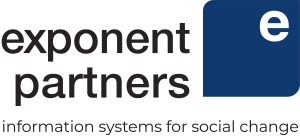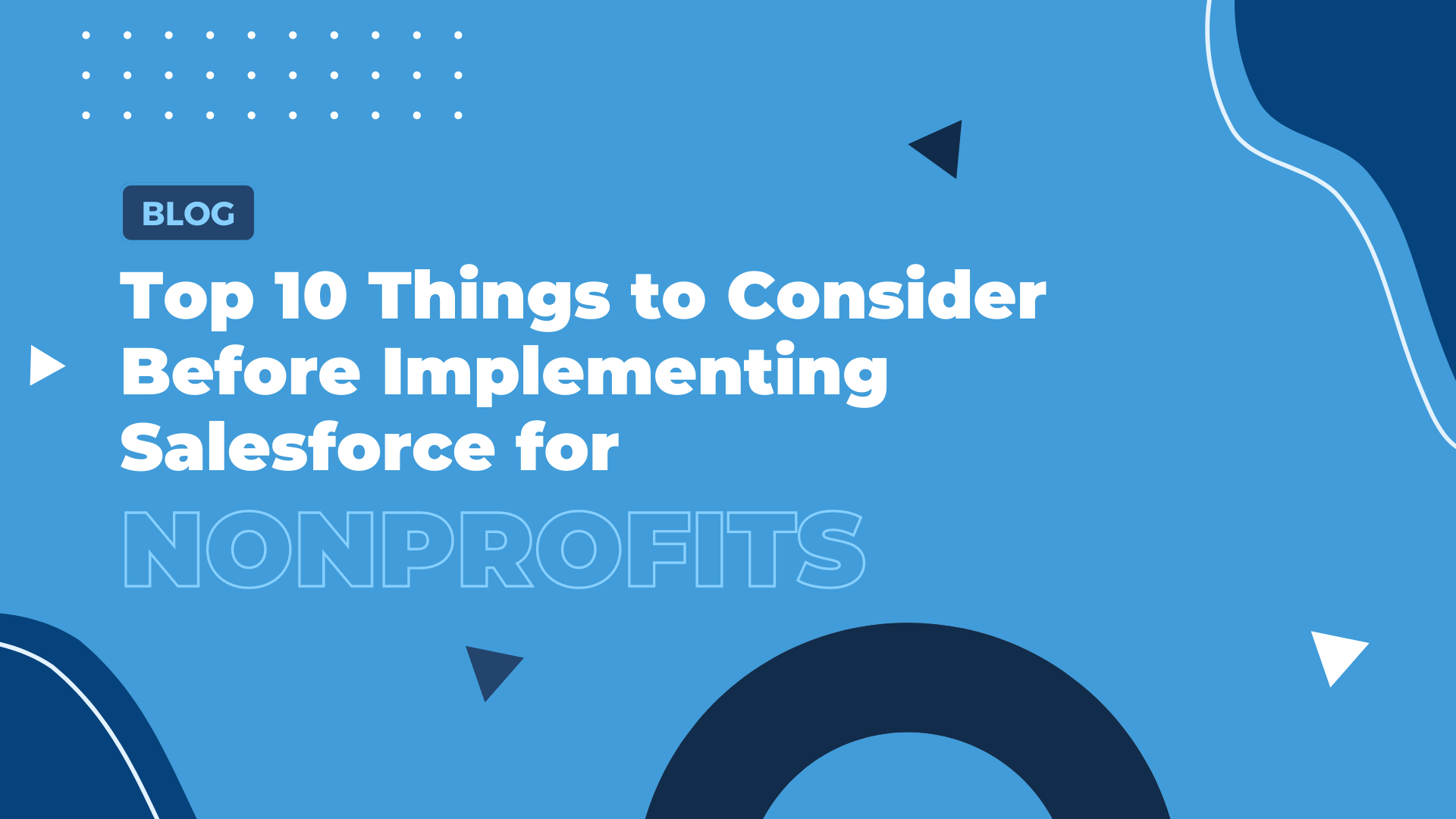10 Things to Consider Before Implementing Salesforce for Nonprofits
As change remains a constant in our ever-evolving world, nonprofit organizations in the Salesforce community often encounter two steadfast challenges: “We didn’t know what we were getting into” and “We didn’t know how or where to start.” These concerns have consistently ranked as the top two obstacles for nonprofits considering Salesforce implementation, as highlighted in a 2013 customer study. Even today, many organizations face these challenges when embarking on their digital transformation journey with the Salesforce platform. The recent introduction of the new Nonprofit Cloud industry-specific solution magnifies the need for careful preparation and expertise in planning, designing, and implementing, and supporting all approaches —including those tailored to the capabilities of this innovative product.
At Exponent Partners, we understand the relentless mission of nonprofit organizations —to transform the communities they serve and drive positive change. We recognize the challenges you may face, including the uncertainty of what lies ahead and the complexities of starting a digital transformation journey. However, we believe that within every challenge lies an opportunity for growth and success. That’s why we’re here to embark on an exciting journey with you, one that harnesses the power of Salesforce and unleashes its full potential for your organization. With our extensive expertise serving human services organizations and our deep understanding of the new Newprofit Cloud solution, we can guide you through these challenges and provide you with the support you need to overcome them.
Now picture this: a future where your nonprofit’s impact knows no bounds. Where every process is streamlined, every donor relationship nurtured, and every program optimized for success. That’s the vision we want to help you achieve. In this journey, we act as your trail guide, helping you navigate the path ahead. Now, let’s talk about the ten key steps you need to take before implementing Salesforce for Nonprofits. We’ve curated this list based on our vast experience working with organizations like yours. Buckle up and get ready for an exhilarating ride!
1) Define your organization’s vision:
Close your eyes and envision the future you want to create. What impact do you hope to make in the long term? Your vision should serve as a guiding star, inspiring every decision and action you take throughout the implementation process.
2) Engage all stakeholders from the start:
Building a successful Salesforce implementation requires a united front. Gather your team, from end-users to top management, and give each person a voice. Together, you’ll lay the foundation for collaboration and shared ownership. Key stakeholder roles to assign:
- The key decision-maker: An individual with authority to make executive decisions on various aspects of the project (e.g., budget and timeline)
- An internal project manager: Someone to keep your project on track and ensure each team continues moving forward toward your organization’s common goals
- Team leads: People nominated to represent their teams and advocate for the end-users in their department (e.g., Marketing, Program Staff, Advancement Officers)
- End-users: Individuals who will use the system regularly (internal employees or clients)
3) Set goals and allocate resources:
Let’s talk about what you want to achieve. Identify pain points, streamline workflows, and imagine how Salesforce can help you reach new heights. Focus on tangible objectives that excite and motivate your team. Some questions to consider as a starting point include:
- What pain points or challenges do your team and end-users face?
- What are the most time-consuming tasks?
- How can you simplify your workflows and processes?
- Where are the communication blocks?
- What does your data look like and how useful is it?
- Do your systems need to talk to each other?
- What do you hope to achieve by implementing Salesforce?
- Do you have the internal capacity to maintain your systems?
Once you understand what your end goals are, you can work backward to identify if the goals are attainable while working within your budget. Some budget considerations include licensing costs and the number of users, consulting and implementation costs, training costs, data migration, and ongoing support costs.
4) Create a roadmap for success:
With goals in place, it’s time to map out your journey. Establish a timeline, set milestones, and track progress along the way. Consider the availability of key team members and ensure a smooth transition from old systems to new ones.
5) Conduct a needs analysis:
Prioritize your Salesforce optimization by focusing on essential functions that align with your goals and vision. Involve stakeholders and gather a list of requirements or desired outcomes from individuals or teams. Collaborate to categorize them into high, medium, and low priorities. Consider engaging a Certified Salesforce Consultant to help perform a needs analysis, identify achievable features, and customize solutions to match your requirements.
Here at Exponent Partners, we have a variety of strategic planning and advisory offerings that ensure your information systems strategy isn’t collecting dust on a shelf. Because we’ve been in your shoes, we understand firsthand the issues you face. Working with you to understand in detail your organizational strategy, and improve your processes, means we build sustainable, future-proof information systems to deliver your mission. Gone are the days of redundant legacy systems with no return on your investment. We make sure you measure the right things to give you real-time insights that drive your performance and speed up your ROI. Contact us today to learn more about our strategic advisory services.
6) Assemble the dream team:
Building the right team is vital for a seamless Salesforce implementation. In addition to Certified Salesforce Administrators, it’s essential to partner with experienced consulting professionals who bring a wealth of knowledge and expertise to the table. By collaborating with a team of experts including project managers, consultants, architects, and developers, you can ensure a successful Salesforce implementation for your nonprofit.
When selecting consulting partners, prioritize those with a proven track record of implementing systems for organizations similar to yours. Their experience and insights will be invaluable in integrating external systems, migrating data, enhancing data management practices, providing comprehensive training, customizing the system to your unique needs, and delivering ongoing maintenance and support.
At Exponent Partners, we have over 1,750 successful social impact projects under our belts, so you’re in safe hands with a specialist team who have deep industry expertise and understand the challenges you face. Our iterative methodology for implementation is tried, tested, and continuously optimized. We start with your core functionality and help you prioritize features, keeping you from getting distracted by infinite options and over-engineered solutions. Think of us as your trail guide, helping to navigate you along the journey. Learn more about our consulting services here and contact us for a free consultation today!
7) Understanding different approaches to project methodology:
When it comes to implementing Salesforce, selecting the appropriate project methodology is key to a successful implementation. There are various project methodologies available, ranging from waterfall to scrum. At Exponent Partners, we have developed an iterative approach that has proven effective for our clients.
Our iterative approach focuses on stakeholder engagement at each step of the process, which is particularly beneficial for change management. We believe in frequent opportunities for feedback, ensuring there are no surprises along the way. Moreover, our methodology provides opportunities for clients to learn about their system and Salesforce, especially if they are new to it.
By following our iterative approach, we show progress and seek feedback from clients throughout the development process. This involvement of key stakeholders and adherence to the core project timeline ensures a smooth and successful implementation.
Learn more about our project methodology here.
8) Empower your team through training:
Before implementing Salesforce, it’s crucial to prepare your team for the changes ahead. Here’s what you need to do:
- System Usage Training: Provide comprehensive training to familiarize your team with Salesforce. Teach them best practices and efficient workflows to maximize their potential.
- Communicate the Purpose: Clearly explain why you’re implementing Salesforce and how it aligns with your goals. Get everyone on board and excited about the positive impact it will have.
- Ongoing Training: Continuously provide training as you make upgrades and enhancements to keep your team up to date.
9) Avoid Overcomplicating the Process:
When implementing Salesforce, simplicity is key. Here’s how to keep things straightforward and user-friendly:
- Start with the Basics: If it’s your first implementation, focus on essential functionality and gradually build upon it. Introduce additional features and customizations once you and your team have a solid foundation.
- Prioritize User Experience: Develop a workflow that simplifies your team’s tasks and aligns with their needs. Salesforce should enhance their work processes, not complicate them.
- Maintain a List of Enhancements: To avoid scope creep, keep a separate list of enhancements and follow-on items that can be addressed in future phases. This allows you to stay focused on the core implementation while keeping track of future improvements.
- Consider End-User Adoption: Keep your end-users in mind throughout the process. Minimize the number of required fields and make data entry as streamlined as possible. Encourage user adoption by making Salesforce a valuable and user-friendly tool.
10) Set up Ongoing Support and Maintenance:
As you embark on your Salesforce journey, it’s crucial to plan for ongoing support. You’ll need someone to handle enhancements, bugs, user issues, and new project requirements as they arise. If you don’t have an in-house IT or support team, Exponent Partners is here to help.
Our success center offerings, including reactive support, virtual administration (“VA” or “virtual admin”), and managed services, are designed to provide comprehensive support to nonprofit organizations like yours. From dedicated virtual Salesforce administrators to expert guidance and managed services, we have the resources to support your Salesforce implementation and beyond.
Contact us today to explore our services and discover how Exponent Partners can propel your organization toward greater success with Salesforce. We can help you to understand the full scope of what you’re getting into and how to get started in a thoughtful way that ensures your success. It’s time to harness its capabilities and unlock a new era of impact and empowerment. Together, let’s make a difference that matters.

